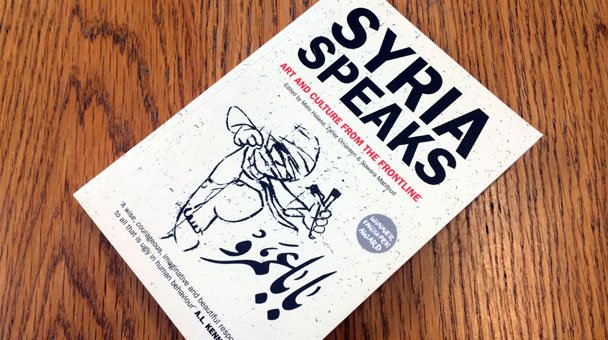
In August, following prosecution of Anjem Choudhary, English PEN was invited to discuss issues of extremism and freedom of expression on Sky News. Robert Sharp discussed the ‘culture of anxiety’ that can lead to censorship, self-censorship, and a ‘chill’ on reading and writing. A clip of the segment is now online.
Transcript:
There is a real culture of anxiety and paranoia that has come about because of PREVENT and this talk about terrorism. Only last week a woman was detained by the police for reading this book on an aeroplane. It’s a brilliant book about Syrian art called Syria Speaks but the flight attendants were paranoid because it had ‘Syria’ and some Arabic language on the cover!
Last year we had a play shut down because it tried to deal with issues of extremism and radicalisation, we’ve even had students and schoolboys being questioned as suspected terrorists. Its not beyond the wit of the politicians to outline the difference between extremism that leads to violence, and political speech and asking questions in the public interest.
So we’re asking the government to consult on the definition of extremism. And we’re asking the government to look again at how Schedule 7 and other aspects of the terrorism act are used when it comes to reading, writing and journalism, as a way of perhaps delineating that line, and giving the public confidence about what can be said and what is unlawful because it is inciting violence.
In July 2016, NHS worker Faizah Shaheen was detained and questioned under Schedule 7 of the Terrorism Act 2000, after airline staff had noted she was reading the English PEN supported book Syria Speaks, published by Saqi Books. English PEN condemned the detention, and sales of the book have soared in recent weeks as readers show solidarity with Ms Shaheen and the artists featured in the anthology.
In August 2015, the National Youth Theatre production Homegrown was abruptly cancelled. The play dealt with radicalisation and disaffection among young people in Britain. In a letter co-ordinated by English PEN, prominent playwrights, authors and theatre practitioners warned that the cancellation “serves only to shut down conversation on these important issues.” The letter warned that “government policy in response to extremism may be creating a culture of caution in the arts.”
Schedule 7 was also used in 2013 to detain David Miranda and seize his journalistic material as he passed through Heathrow airport. In January 2016 decision on Miranda’s application for a judicial review, the Court of Appeal found that Schedule 7 ‘is not subject to adequate safeguards against its arbitrary exercise’ and recommended parliament enact better safeguards for journalists. English PEN intervened as a third party in the application and subsequet appeal.